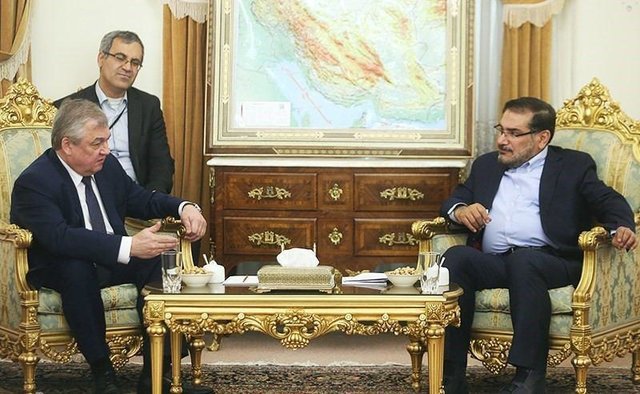No deal must lead to Syria division: Shamkhani

TEHRAN – Iran’s Supreme National Security Council Secretary Ali Shamkhani asserted on Saturday that any agreement on the Syrian conflict must not lay the ground for the disintegration of Syria, reiterating Tehran’s position that it is necessary to respect the Syrian sovereignty.
Shamkhani made the remarks after a meeting in Tehran with Alexander Lavrentiev, Russian President Vladimir Putin’s special envoy on Syria.
Iran and Russia back Syrian President Bashar al-Assad in the Syrian crisis, one for seven years now.
Lavrentiev was visiting Iran after Putin and his U.S. counterpart Donald Trump agreed on a cease-fire in southwest Syria on July 7. The agreement was made after Putin and Trump met on the sidelines of the G-20 summit in Hamburg, Germany.
After the meeting concluded, Russia's Foreign Minister Sergey Lavrov, who was present at the meeting, said that Russia, the U.S., and Jordan have issued a joint memorandum on establishing a de-escalation zone in southwest Syria, in the regions of Daraa, Quneitra and Suwayda.
U.S. Secretary of State Rex Tillerson who was also present in the meeting said, "I think this is our first indication of the U.S. and Russia being able to work together in Syria."
Reacting to the Moscow-Washington deal, Iran’s Foreign Ministry spokesman said on Monday Tehran would welcome the ceasefire initiative provided that it takes effect in other areas across the country, as well.
Before the move, Russia had cut all coordination channels with Washington after the U.S. Air Force shot down a Syrian fighter in June.
Elements use ceasefire to recruit
Iran’s top security official also noted that the Zionist regime of Israel takes actions to weaken the Syrian government and change the political and security equilibrium in order to undermine the resistance front.
“The Zionist regime of Israel establishes deep and expansive relations with terrorist groups and their supporters and seeks to use these groups as a tool to provide security in Israel’s borders,” he stated.
Elsewhere, he said that some elements within terrorist groups use ceasefire and political dialogue as opportunities to recruit forces which is “unacceptable” and a source of concern.
“It has been proven by experience that these elements are not committed to any agreement and use any opportunity to kill the innocent people in order to achieve their inhumane objectives,” Shamkhani added.
He also described the Astana talks on Syria as a “successful strategy” that can help put an end to the crises in the Middle East.
Brokered by Russia, Iran and Turkey since the beginning of 2017, the Astana talks have brought representatives from the Syrian government and opposition groups to the negotiating table in order to find a solution to the Syrian conflict.
So far, the sides have convened at the Kazakh capital five times with the sixth round due to take place at the end of August.
The signature achievement of the Astana initiative was agreed upon during the fourth round of negotiations in May 4 as Russia, Turkey and Iran agreed to establish four separate de-escalation zones in Syria for at least six months.
The largest of the planned zones includes Idlib province, which neighbors Turkey, and adjoining districts of Hama, Aleppo and Latakia provinces.
The other three zones are in northern Homs province, the Eastern Ghouta region east of the capital Damascus and along the Jordanian border in southern Syria.
NA/PA
